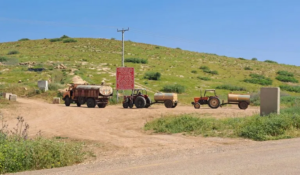Israeli army reduces hours at West Bank checkpoint, local Palestinians struggle to obtain water

Trucks and tractors carrying water to villages in the Jordan Valley, 17 July 2024
Bar Peleg reports in Haaretz on 18 July 2024:
The Israeli army has reduced the hours of activity at a checkpoint in the West Bank, which has left Palestinians who live in the area are struggling to bring water to their villages.
Communities of shepherds who live in the northern Jordan Valley rely on water they purchase from the nearby town of Atuf because their homes are not connected to a water supply. These communities, numbering about 30 families in total, receive water by means of a large water tank that is pulled by a tractor, or a water tanker that goes from one community to the other.
Israeli activists who assist the local residents say the reduction in hours that the checkpoint is operating is delaying the water tankers, leaving the Palestinians there without enough water.
In order to get to Atuf, the water tanker and the tractor must pass through a checkpoint next to the Ro’i settlement that was set up after the Israel-Gaza war began. The army says this is because of several terror attacks that have taken place in the Jordan Valley.
The army informed the local residents ahead of time of the checkpoint’s hours of operation. Initially, it was just four hours a day, and then in April it was extended to 12 hours, from 6 A.M. to 6 P.M., in order to enable a larger amount of water to be brought through. Now the army has resumed opening the checkpoint for just four hours a day altogether, due to operational considerations, an army source says.
Last Friday, a shepherd named Adel came back from filling up water in Atuf at 6:45 A.M. and found the checkpoint closed. Asked by activists who wished to assist him and others in the area, the army informed that the operating times at the checkpoint had been cut back to four hours a day – from 4:30-6:30 A.M. and 11 A.M.–1 P.M.
At the height of summer, Adel had to wait there with the tractor until soldiers arrived to open the gate, and they only showed up at 11:30 A.M. “The truck driver who is coming tomorrow called me today and wanted to know if the checkpoint would be open. I didn’t know what to tell him,” says Yusuf (pseudonym), a father of 10 who keeps goats that require 10 cubic meters of water day.
“I don’t remember a summer as hot as this one and I’m 50 years old. We don’t sleep. I dream about water all night long, about where I’ll be able to get water from tomorrow,” he says. “My children have left and gone to a nearby village because there’s no water. If the gate stays closed for two days, I don’t know where we’ll go or how we’ll live.”
The army says that the road where the checkpoint was installed is sometimes used for smuggling explosives. It also says that the local residents were given a phone number they can call to request that the checkpoint be opened, and that there are two other points where water tankers can pass through, and also be given priority in line.
“Driving to the other checkpoints takes a long time, three or four hours round trip, plus however long you have to wait,” says one of the activists. “Also, the shepherds have told us from experience that the army doesn’t really decide who goes first. Cars that have been waiting for hours in line won’t let the trucks pass,” she says. “In the end, it means they have to spend a whole day just to get water.”
The IDF responds: “The gate was installed at the location for security reasons and after the need for it was determined in addition to the alternatives available to the local residents for access to roads, lands and natural resources. A temporary increase in opening the gate was possible because of the situation at that time. Currently, on the basis of the latest situational assessment and the present security threat, the gate needs to be kept closed. While the gate may be opened with prior coordination, there are two other checkpoints available for the passage of laborers and to enable the flow of traffic in the area.”
This article is reproduced in its entirety
